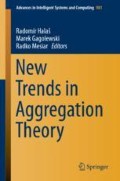Abstract
A certain connection between the theory of aggregation functions and the theory of concept lattices is discussed. We describe a generalization of residuated mappings, convenient for creating a monotone analogue of antitone concept lattices. Examples of such mappings are also presented.
Access this chapter
Tax calculation will be finalised at checkout
Purchases are for personal use only
Notes
- 1.
The authors are aware that this notion can be defined in other contexts under another name.
References
Antoni, L., Krajči, S., Krídlo, O., Macek, B., Pisková, L.: On heterogeneous formal contexts. Fuzzy Set. Syst. 234, 22–33 (2014)
Antoni, L., Krajči, S., Krídlo, O.: On fuzzy generalizations of concept lattices. Stud. Comput. Intell. 758, 79–103 (2018)
Bartl, E., Konecny, J.: L-concept analysis with positive and negative attributes. Inf. Sci. 360, 96–111 (2016)
Bělohlávek, R., Konecny, J.: Concept lattices of isotone vs. antitone Galois connections in graded setting: mutual reducibility revisited. Inf. Sci. 199, 133–137 (2012)
Brajerčík, J., Demko, M.: On sheaf spaces of partially ordered quasigroups. Quasigroups Relat. Syst. 22(1), 51–58 (2014)
Butka, P., Pócs, J., Pócsová, J.: On equivalence of conceptual scaling and generalized one-sided concept lattices. Inf. Sci. 259, 57–70 (2014)
Demko, M.: On congruences and ideals of partially ordered quasigroups. Czechoslovak Math. J. 58(3), 637–650 (2008)
Demko, M.: Lexicographic product decompositions of half linearly ordered loops. Czechoslovak Math. J. 57(2), 607–629 (2007)
Derderian, J.-C.: Residuated mappings. Pac. J. Math. 20(1), 35–43 (1967)
Ganter, B., Wille, R.: Formal Concept Analysis: Mathematical Foundations. Springer, Berlin (1999)
Georgescu, G., Popescu, A.: Non-dual fuzzy connections. Arch. Math. Log. 43(8), 1009–1039 (2004)
Halaš, R., Mesiar, R., Pócs, J.: Description of sup- and inf-preserving aggregation functions via families of clusters in data tables. Inf. Sci. 400401, 173–183 (2017)
Medina, J., Ojeda-Aciego, M., Ruiz-Calviño, J.: Formal concept analysis via multi-adjoint concept lattices. Fuzzy Set. Syst. 160, 130–144 (2009)
Konecny, J.: Isotone fuzzy Galois connections with hedges. Inf. Sci. 181(10), 1804–1817 (2011)
Konecny, J., Osicka, P.: Triadic concept lattices in the framework of aggregation structures. Inf. Sci. 279, 512–527 (2014)
Pócs, J.: On possible generalization of fuzzy concept lattices using dually isomorphic retracts. Inf. Sci. 210, 89–98 (2012)
Rodriguez-Jimenez, J.M., Cordero, P., Enciso, M., Mora, A.: A generalized framework to consider positive and negative attributes in formal concept analysis. In: 11th International Conference on Concept Lattices and Their Applications (CLA 2014), vol. 1252, pp. 267–278. CEUR Workshop Proceedings (2014)
Rodriguez-Jimenez, J.M., Cordero, P., Enciso, M., Mora, A.: Negative attributes and implications in formal concept analysis. Procedia Comput. Sci. 31, 758–765 (2014)
Acknowledgments
The first author was supported by the Slovak Research and Development Agency under the contract no. APVV-16-0213. The second author was supported by the project of Grant Agency of the Czech Republic (GAČR) no. 18-06915S and by the Slovak Research and Development Agency under the contract no. APVV-16-0073. The third author was supported by the Slovak VEGA Grant 1/0365/19.
Author information
Authors and Affiliations
Corresponding author
Editor information
Editors and Affiliations
Rights and permissions
Copyright information
© 2019 Springer Nature Switzerland AG
About this paper
Cite this paper
Butka, P., Pócs, J., Pócsová, J. (2019). Note on Aggregation Functions and Concept Forming Operators. In: Halaš, R., Gagolewski, M., Mesiar, R. (eds) New Trends in Aggregation Theory. AGOP 2019. Advances in Intelligent Systems and Computing, vol 981. Springer, Cham. https://doi.org/10.1007/978-3-030-19494-9_26
Download citation
DOI: https://doi.org/10.1007/978-3-030-19494-9_26
Published:
Publisher Name: Springer, Cham
Print ISBN: 978-3-030-19493-2
Online ISBN: 978-3-030-19494-9
eBook Packages: Intelligent Technologies and RoboticsIntelligent Technologies and Robotics (R0)

